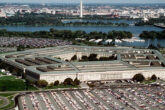February 23, 2018
Handicapping the Navy’s Frigate Competition
The horses in a major new defense-acquisition program are approaching the starting gate, but it’s not too late to handicap the race and place bets on the eventual winner. The process is easier in this competition because, unlike recent previous major program buys, the Navy limited this competition to proven “mature” designs, to include submissions from foreign ship-builders so long as they partnered with an American shipyard. The net result is a competitive field made up of participants with established track records and approximate prices.
Last week the Navy announced the five finalists in its new guided-missile frigate competition.
Traditional American shipbuilders Huntington Ingalls Incorporated and General Dynamics made the cut, although General Dynamics made it into the competition by partnering with Spain’s Navantia and using its F-100 frigate design. Huntington Ingalls appears to have presented a design derived from its National Security Cutter, currently in production for the U.S. Coast Guard.
Read the full article in National Review.
More from CNAS
-
The Department of Defense’s Breakthrough Nuclear Moment Risks Slipping Away
Unless they act, the Department of Defense’s breakthrough nuclear moment may vanish before it really happens....
By Will Rogers
-
DEFAERO Strategy Series [Apr 09, 25] CNAS' Becca Wasser and Phil Sheers on Revitalizing the U.S. Defense Industrial Base
On this episode of the Defense & Aerospace Report Strategy Series, sponsored by General Atomics Aeronautical Systems, Becca Wasser and Phil Sheers of the Center for a New Amer...
By Becca Wasser & Philip Sheers
-
From Production Lines to Front Lines
Executive Summary The U.S. defense industrial base (DIB) is struggling to meet the demands of the current strategic environment—let alone prepare for a potential conflict agai...
By Becca Wasser & Philip Sheers
-
The Pentagon’s Endangered Brain Trust
In this environment, sound assessments of emerging threats and new ideas to counter them will be especially vital....
By Dr. Andrew Krepinevich, Jr.




